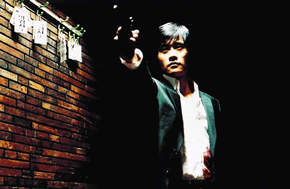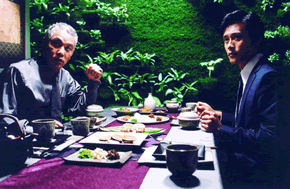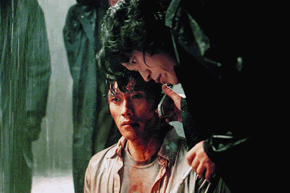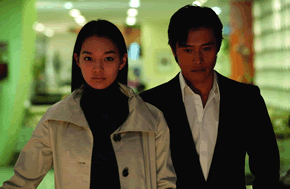Genre: Action
Director: Kim Jee-Woon
Starring: Lee Byung-Hun, Kim Young-Chil, Shin
Mina, Hwang Jung-Min,
RunTime: 2 hrs
Released By: Shaw & Innoform
Rating: M-18 (Violence)
Opening Day: 15 September 2005
Synopsis:
He just wanted to keep faith without harming the girl.
But
the whole world called him enemy from that moment.
A
sky lounge bar & restaurant at a hotel, floating like
an island in one side of the sky above Seoul. That place is
a small castle of Sun-Woo, a keen and sharp perfectionist.
After spending 7 years serving his boss, President Kang and
obtaining his absolute trust, Sun-Woo became the person who
managed the sky lounge. With his silent faithfulness not to
ask why and a perfect of handling business, he won his boss’
trust.
A
cold-hearted boss, President Kang punished rule-breakers regardless
of any mistakes they made. He had a secret that he cannot
tell anybody: that is his young lover, Hee-Soo. President
Kang orders Sun-Woo to watch her out of the doubt that she
might have another lover, and if it turns out true, to kill
her.
On
the third day when Sun-Woo started following Hee-Soo, he made
a surprise attack on the place where Hee-Soo was with her
boyfriend. However, at the last moment, he let them go after
much hesitation.
Sun-Woo
believed that everything can return to the normal state. However,
due to this decision that he made, Sun-Woo starts an irreparable
war against the whole gang who were his own brothers until
the day he spare Hee-Soo’s life.
Movie
Review:
Film noir has been a dying art.
For
those who are not familiar with this genre, it is defined
as “a stylistic approach to genre films forged in depression
era detective and gangster movies and hard-boiled detective
stories which were a staple of pulp fiction.” (Dictionary.com)
In French, film noir is known as “black film”
for its dark humour, depressive ambience and dark lighting.
And it’s an open secret that the protagonist in the
film is often an anti-hero, a tortured being with internal
conflicting interests who usually doesn’t walk away
smiling at the end of the film.
Hollywood
is known for producing such films in the early years, with
actresses such as Barbara Stanwyck and Lauren Bacall leading
the pack in this genre, such as Double Indemnity (1944) and
The Big Sleep (1946) respectively. However, this genre has
not been forthcoming from Hollywood in recent years. And just
as movie lovers thought that all is lost, Korea has taken
over the helm in producing films of such genre.
Even
more surprising is the fact that Korean director Kim Jee-Woon
will take a shot, considering that his previous works have
been horror, such as the segment “Memories” in
Three (2002) and A Tale of Two Sisters (2003). However, he
pulls it off very well, especially the fact that he manages
to transform a simple love story in the midst of betrayal
into a masterpiece.
Lead
actor Lee Byung-Hun has always been known for his masculine
physique and chiselled features (Think Joint Security Area
(2000) and Korean drama All In (2003)). However, it’s
his breakthrough performance in Everybody has Secrets (2004)
in which he seduced all three sisters that people start to
take notice of his alter ego: his sexual appeal as a metrosexual.
In
this film, Byung-Hun takes on the role of a manager, Sun-Woo,
of a swanky hotel. While all is calm on the surface, Sun Woo
is in reality more than a manager. He is a member of the Korean
mafia, a seasoned and hardened fighter who has served his
boss President Kang for 7 years. Doubling as a bouncer for
the hotel, he also deals with “unfinished” business,
such as bashing up hooligans who refuse to leave the hotel
premises after operating hours. One day, he’s assigned
by his boss to keep an eye on his young lover Hee-Soo (Shin
Mina) and was ordered to kill her should Hee-Soo’s love
for him waver. However, when Sun-woo found out about Hee-Soo’s
infidelity, his humanity got the better of him and he failed
to pull the trigger. And with this betrayal of trust, the
mafia turned on Sun-Woo.
This
film rates high on action and will definitely go down well
with hardcore fans of stylistic violence portrayed on celluloid.
Especially so is the emphasis on the calm before the storm,
whereby violence and backlash erupts in a fragment of a second
without any form of warning. A pivotal scene in this film
depicts a fuming Sun-woo kicking the asses of two punks who
taunts him on the road (Road bullies beware!). The sequences
for this scene is perfectly-executed, with the underlying
rage of Sun-Woo clearly exhibited.
A
Bittersweet Life will most probably be compared with Old Boy,
another acclaimed Korean film noir helmed by Park Chan-Wook.
However, these two films excel on their own merits and should
not be contrasted. While Old Boy’s thematic use of incest,
betrayal and vengeance strengthens the plot, A Bittersweet
Life transcends conventional, formulaic narrative structures
through the use of unique cinematography.
Credits should be given to director Kim Jee-Woon for his artistic
directions in this film. Through the use of philosophical
analogies and metaphors, he has successful imbued his artistic
vision into the film. Especially noteworthy is the message
in the opening credits, that it’s always the human heart
and mind that move, never an external object. This message
encompasses what this film is all about, that things are not
always what they seem on the surface. A storm may be brewing
and what is seen as serene and tranquil is actually the calm
before the storm.
It
will be an injustice to end this review without giving credit
to the scene at the start of the film, where Sun-Woo makes
his way to the basement upon receiving a phone call. The trip
from a luxurious lounge to the mundane kitchen to the dirty
basement serves as an apt metaphor to depict his journey through
life.
It’s
about one man’s downward spiral towards decadence and
a life of unfulfilled dreams.
Movie Rating:
   
(“Lee
Byung-Hun shines in this film noir that reeks of turbulence
beneath a state of normality. One of Korea’s finest
films this Year! ”)
Review
by Patrick Tay
|






